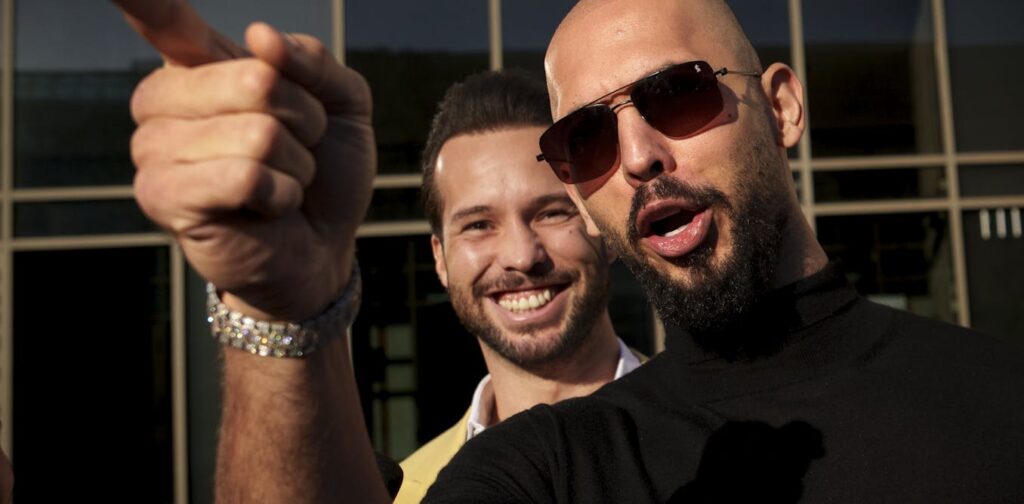This week, British authorities formally charged social media personality Andrew Tate with multiple serious sexual offenses, including allegations of rape and human trafficking, purportedly committed within the UK between 2012 and 2015.
These charges follow ongoing legal proceedings in Romania, where Tate and his brother Tristan are accused of coercing and exploiting women through a manipulative scheme often described as the “loverboy tactic.” This method involves psychologically controlling women to exploit them via webcam performances for financial gain.
Known for his outspoken misogyny, Tate has become a prominent figure within the so-called “manosphere,” a loosely connected online community that promotes traditional gender roles and often espouses anti-feminist views. His influence extends globally, with his social media following surpassing ten million followers on platforms like X (formerly Twitter).
The recent legal developments are likely to reinforce the loyalty of his core supporters-primarily young men and boys-who perceive him as a victim of a corrupt system targeting outspoken masculinity.
Understanding Andrew Tate’s Public Persona
Andrew Tate is a former professional kickboxer and a British-American social media influencer. He gained international notoriety through his provocative videos and statements that often promote a hyper-masculine ideal rooted in wealth, physical strength, and dominance.
His online persona combines elements of self-help advice, provocative commentary, and conspiracy theories. Tate advocates for a version of masculinity that emphasizes material success, physical fitness, and a disdain for what he describes as “feminized” societal norms. For example, he has controversially claimed that women should be held accountable for sexual assault, a statement that has sparked widespread criticism.
As a leading figure within the “manosphere,” Tate influences a network of online communities that propagate regressive ideas about gender and male identity. His messaging often appeals to young men feeling disenfranchised by social, economic, or cultural shifts, offering them a sense of belonging and purpose amid a perceived societal decline.
This narrative fosters an emotional connection, framing the modern world as hostile to traditional masculinity. His rhetoric openly celebrates misogyny and reinforces harmful gender stereotypes, which has been linked to increased sexist attitudes and hostility toward women in educational settings, including classrooms.
The Impact of Tate’s Ideology on Society
Given the gravity of the current allegations, it is unlikely that Tate’s reputation will be significantly diminished in the eyes of his most devoted followers. While many young men reject his views, a dedicated minority continues to see him as a martyr fighting against a corrupt establishment.
For his core supporters, these legal charges are often framed as a conspiracy against a truth-teller, further fueling their loyalty. This narrative of persecution allows Tate to position himself as a victim of a biased system, which in turn normalizes and even glorifies aggressive misogyny.
This pattern mirrors the response seen when similar figures, such as former U.S. President Donald Trump, faced legal challenges. Despite multiple indictments and civil judgments-Trump was found liable for sexual assault in a civil case-his base remains steadfast, viewing these issues as politically motivated attacks rather than evidence of wrongdoing.
Likewise, Tate’s supporters interpret his defiance and anti-establishment stance as proof of his integrity, reinforcing his influence and making it more difficult to challenge his narrative.
Anticipating Future Reactions and Strategies
Historically, Tate and his brother Tristan are expected to deny the charges outright, while simultaneously leveraging the situation to deepen their mythos. They are likely to invoke themes like “the matrix”-a term used to describe a shadowy elite manipulating society-and portray the legal proceedings as part of a broader effort to silence outspoken men.
They will probably frame the accusations as attacks on their identity as disruptors of a declining, overly feminized society. This victim-perpetrator framing resonates strongly with their followers, who are predisposed to see such conflicts as part of a larger cultural war.
Consequently, their supporters are expected to respond with increased loyalty, viewing the allegations not as evidence of guilt but as confirmation of a conspiracy against their hero. For those already immersed in online misogyny and disillusionment, such moral accusations often serve to reinforce their existing beliefs rather than challenge them.
This dynamic complicates efforts to counteract Tate’s influence. Merely exposing or condemning his actions may not suffice, as his narrative thrives on controversy and martyrdom.
Research indicates that Tate’s popularity is fueled not despite controversy but because of it. To effectively address the harm caused by figures like him, a comprehensive, long-term approach is essential. This includes implementing robust gender education in schools, promoting critical media literacy, and supporting role models who can engage with young men on emotional and social levels without endorsing misogyny.
Such initiatives could involve influencers like Will Hitchins, youth workers, and community leaders of all genders, working together to challenge harmful stereotypes and promote healthier notions of masculinity.
Ultimately, the key lesson is that even criminal charges or convictions may not diminish the influence of prominent figures within the “manosphere.” Their appeal often extends beyond their actions, rooted in a broader cultural and emotional landscape that requires nuanced, sustained intervention.

